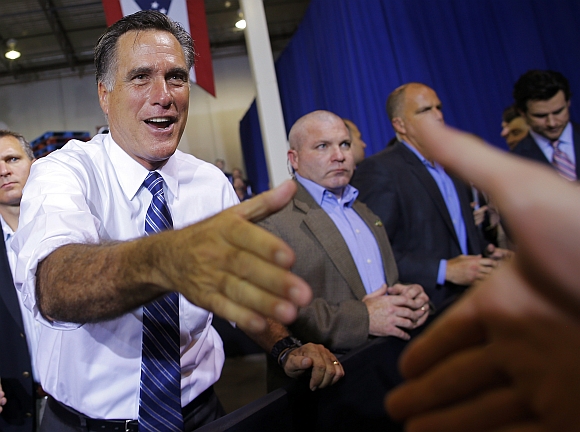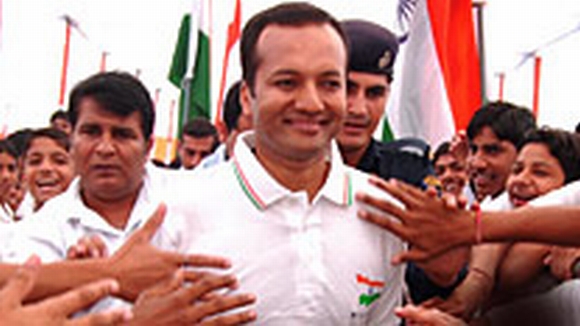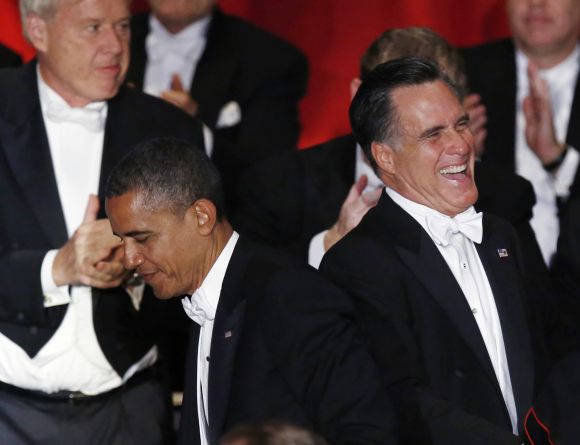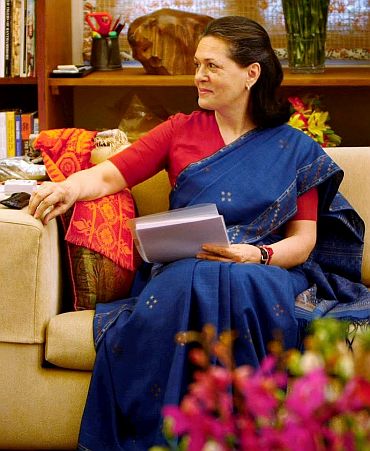
Nitin Gadkari and Naveen Jindal should have dissociated themselves from decision-making related to their companies while functioning as political leaders, says B Raman
Bharatiya Janata Party president Nitin Gadkari and Congress Member of Parliament Naveen Jindal are businessmen who have entered politics and have continued to be associated with decision-making relating to their companies even while playing their political role.
Congress president Sonia Gandhi, whose party is in power now, is the mother-in-law of Robert Vadra, who has prospered in business after marrying her daughter Priyanka.
Mitt Romney is a member of the United States Republican Party and he belongs to a well-known business family of Massachusetts. He entered politics and become the governor of his state. He is now contesting the US presidential elections against President Barack Obama.
Gadkari has got involved in a huge controversy because of his continued association with his business companies when he was the public works department minister in the Maharashtra Cabinet in the 1990s and now as the president of the BJP.
Click on NEXT for more...

Jindal has got involved in an embarrassing controversy because of his continued association with his steel business even while serving as a MP. He has allegedly benefitted from a coal mining block allotted to him by the government.
There is nothing wrong in businessmen entering politics provided they do not profit in their businesses as a result of their political position and they do not allow their political role to influence their business decision-making. How can political and business rectitude be reinforced when businessmen take to politics?
It would be useful to make a case study of Romney in the US. He was associated with some business companies of his state investing in and trading with China. One of the companies was allegedly even dealing with telecommunications which is a sensitive area from the point of view of national security.
Before Romney decided to enter politics and contest as governor of his state, he made a public statement of all his business interests and holdings, formed a public trust in respect of each of his companies and dissociated himself from all decision-making in respect of these companies.
Click on NEXT for more...

Those who had watched the second Presidential debate between Romney and Obama, would have noticed that the US President questioned Romney's association with business companies investing in and trading with China. Romney replied that the affairs of these companies are managed by a public trust and he is not associated with their decision-making. Obama was satisfied with his reply and did not pursue the matter.
In India, huge controversies have arisen related to the business backgrounds of Gadkari and Jindal because they did not dissociate themselves from decision-making related to their companies while functioning as political leaders holding key positions. The public perception is and will be that they have benefitted in their businesses as a result of their political role and influence.
Gadkari was a public servant when he was the PWD minister. As the president of BJP, he is not a public servant now.
Jindal is a public servant as a member of the Parliament and is subject to the jurisdiction of the Prevention of Corruption Act.
Had he been a member of the US Congress and had he been allotted a coal mining block, the legal and public assumption in the US would have been that he did not get the block on merits but by virtue of his being in the Congress. To avoid such perceptions, all public servants in the US form public trusts of their businesses and dissociate themselves from decision-making.
Click on NEXT for more...

In the case of Sonia Gandhi, the wrong-doing was of a different kind. When the Congress was elected to power in 2004, political rectitude demanded that she inform all government departments at the Centre and in states where the Congress was in power that her son-in-law is a real estate businessman and he should not be shown any favours because of his being her son-in-law. She did not do so.
When the controversy regarding the real estate wheeling and dealing of Vadra recently broke out, she should have immediately written to Prime Minister Manmohan Singh, urging him to look into all his real estate dealings in which government departments were involved and satisfy himself that there was no wrong-doing.
She did not do that either. Instead, allegedly at her prodding, a number of senior ministers of Dr Singh's Cabinet embarked on a cover-up and damage control exercise to prevent any political embarrassment to her and to deny any criminal liability of Vadra.
The controversies related to Gadkari, Jindal and Gandhi call for follow-up action at two levels. An enquiry into all allegations made to rule out civil or criminal wrong-doing and introduction of conflict of interest provisions in our laws to enforce rectitude when businessmen want to enter public life.
Click on NEXT for more...
...
Photographs: Reuters